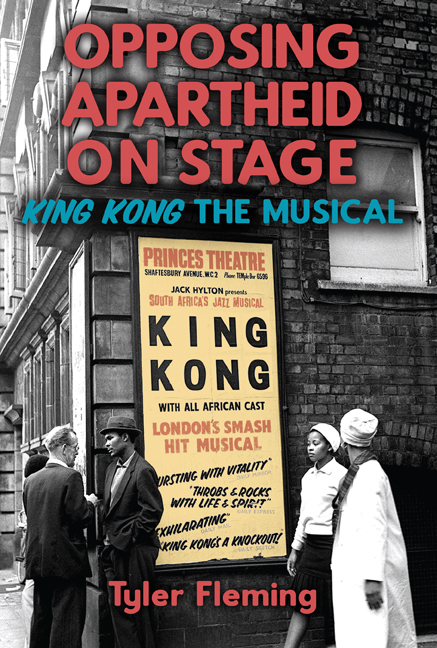Book contents
- Frontmatter
- Dedication
- Contents
- Acknowledgments
- Introduction
- 1 “Marvelous Muscles”: A History of Ezekiel Dlamini, the Real King Kong
- 2 Creating a “Back of the Moon”: The Union of Southern African Artists and Interracial Collaboration behind the “All-African” Musical
- 3 “Quickly in Love”: Popular Reception of the 1959 King Kong and Entertaining the Possibilities of a Different South Africa(s)
- 4 “Kwela Kong”: The Trials and Tribulations of a South African Musical Abroad in 1961
- 5 “Sad Times, Bad Times”: Issues of Exile, the King Kong Cast, and South African Jazz in Britain, 1961–1980
- 6 “The Boy's [and Girl’s] Doin’ It”: Moving to America and Rediscovering Africa, 1960–1989
- 7 “Death Song”: The 1979 Remake of King Kong and the Power of Cultural Memories under Apartheid
- Notes
- Bibliography
- Index
- Rochester Studies in African History and the Diaspora
7 - “Death Song”: The 1979 Remake of King Kong and the Power of Cultural Memories under Apartheid
Published online by Cambridge University Press: 06 October 2020
- Frontmatter
- Dedication
- Contents
- Acknowledgments
- Introduction
- 1 “Marvelous Muscles”: A History of Ezekiel Dlamini, the Real King Kong
- 2 Creating a “Back of the Moon”: The Union of Southern African Artists and Interracial Collaboration behind the “All-African” Musical
- 3 “Quickly in Love”: Popular Reception of the 1959 King Kong and Entertaining the Possibilities of a Different South Africa(s)
- 4 “Kwela Kong”: The Trials and Tribulations of a South African Musical Abroad in 1961
- 5 “Sad Times, Bad Times”: Issues of Exile, the King Kong Cast, and South African Jazz in Britain, 1961–1980
- 6 “The Boy's [and Girl’s] Doin’ It”: Moving to America and Rediscovering Africa, 1960–1989
- 7 “Death Song”: The 1979 Remake of King Kong and the Power of Cultural Memories under Apartheid
- Notes
- Bibliography
- Index
- Rochester Studies in African History and the Diaspora
Summary
Twenty years after King Kong's 1959 debut, Ian Bernhardt staged a remake of the musical. In a period as tumultuous and divided as South Africa during the late 1970s, remaking King Kong and rekindling the goodwill created by the original production proved particularly ambitious. Unlike its predecessor, the 1979 version cannot be viewed as a success. In-fighting between producers and the director, horrid reviews by the white press, mixed ones by the black media, tepid support from the public, and even a threatened lawsuit combined to sink the production. Instead of touring the country and going overseas, King Kong's 1979 run lasted just a few weeks, playing to near-empty houses.
Since its run was so short, many treat the 1979 production as an inconsequential moment in South African history. This chapter challenges that assumption by arguing that the reactions from the public and press speak volumes about King Kong's lasting and pervasive legacy within South African society. The controversies surrounding the 1979 remake highlight the original musical's unique place in South African popular memory as well as how the tastes of black and white theatergoers had diverged since 1959. Whereas the original’s popularity spanned the races, whites overwhelmingly despised the 1979 version while African theatergoers proved at least slightly more accepting, which hints at the divergent sensibilities and needs of both communities—a divide that had become quite pronounced and palpable by 1979.
Shifts in Black Theater since 1959
South Africa underwent drastic changes in the two decades between the original 1959 production and its 1979 revival. The state had banned most black political organizations, such as the ANC and PAC, by the mid-1960s. Many of their leaders were imprisoned or exiled. After peaceful demonstrations failed to produce results and the state’s increasing crackdowns on anti-apartheid protest, violence became a more accepted means of resisting the apartheid regime. Some activists joined liberation armies like the ANC's Umkhonto we Sizwe and the PAC's Poqo. Black political movements also generally drifted away from alliances with white liberals with the rise of the PAC in the 1960s as well as the emergence of Steve Biko and 1970s black consciousness movement.
- Type
- Chapter
- Information
- Opposing Apartheid on StageKing Kong the Musical, pp. 228 - 272Publisher: Boydell & BrewerPrint publication year: 2020



